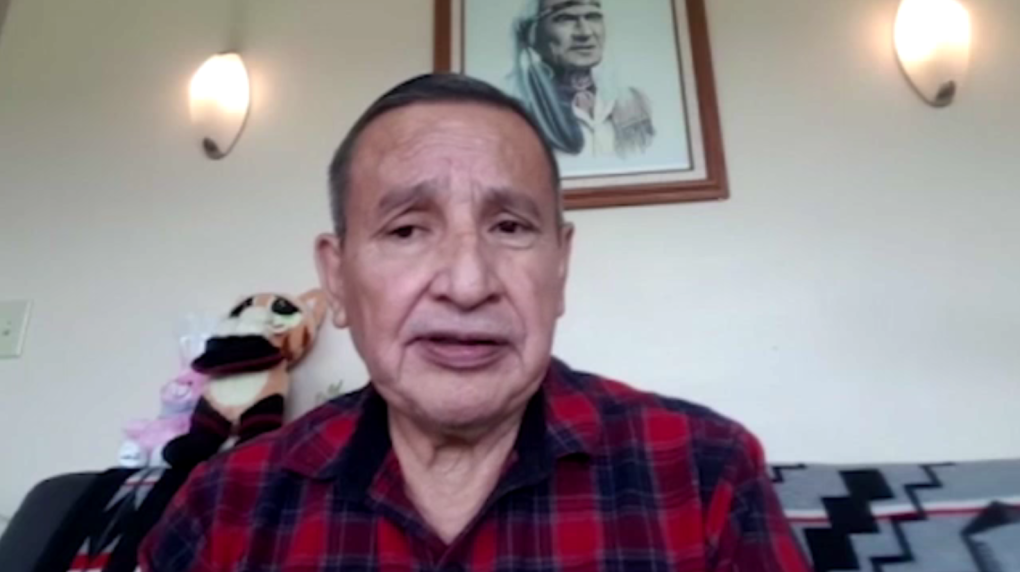B.C. passes 1st-in-Canada legislation giving Indigenous peoples jurisdiction over family services, child welfare
 Grand Chief Stewart Phillip, president of the Union of BC Indian Chiefs, spent his entire childhood in foster care.
Grand Chief Stewart Phillip, president of the Union of BC Indian Chiefs, spent his entire childhood in foster care.
British Columbia has become the first jurisdiction in Canada to recognize and uphold the rights of Indigenous communities to provide their own child and family services.
On Friday morning, the province announced the historic passing of the Indigenous Self-Government in Child and Family Services Amendment, almost one month to date since B.C. proposed overhauling its child-welfare system.
“The legislative amendments remove barriers and gaps within provincial legislation, enabling the Province and Indigenous Peoples to collaborate and ensure Indigenous Peoples can govern and provide services based on their own child and family laws,” the Ministry of Children and Family Development said in a news release.
B.C. first proposed the changes, which Indigenous people have long-advocated for, on Oct. 26 under former premier John Horgan. The new act is meant to address the overrepresentation of Indigenous children in care.
At the time they were proposed, Grand Chief Stewart Phillip of the Union of BC Indian Chiefs said the legislation couldn’t be passed soon enough.
“The colonial era of the Province controlling child welfare must come to an end,” Phillip said last month. “It brings me incredible joy to think about this change in my lifetime, and for my grandchildren and great grandchildren."
According to Statistics Canada, Indigneous children made up nearly 54 percent of those under the age of 14 in foster care in 2021. Data shows only 7.7 per cent of children in that age group are Indigenous.
The numbers are even higher in B.C., according to provincial data that shows Indigenous children represent 68 per cent of those in care.
The amendments, which the province says are the most significant passed in more than 25 years, also creates a new Indigenous child welfare director within the ministry. This person will provide advice and guidance to the province on how to better support Indigenous children and youth, according to the release.
B.C.’s Cowichan Tribes and the Nations of Gwa’sala-‘Nakwaxda’xw, Splatsin and Sts’ailes are currently working with the province to exercise their jurisdiction.The ministry says more First Nations are preparing to begin the process.
BC Assembly of First Nations Regional Chief Terry Teegee acknowledges the end of this era will not put a stop to hardships Indigneous people face in this province.
“The forced removal of children for generations, through residential schools and the child-welfare system has been a deep source of pain and injustice” Teegee said when the amendments were proposed.
“Will it be easy to make all the changes needed when it has been entrenched for so long that First Nations have not been seen as good parents due to racism and stereotypes? No, it will not, but we will never go back to those days again, and together we will work to ensure that children grow up to be the people they wish to be with the love and support of our peoples in every part of their lives.”
CTVNews.ca Top Stories

Justin Trudeau to step down as PM following Liberal leadership race
Prime Minister Justin Trudeau is stepping down as Liberal leader, and is proroguing Parliament as the Liberal Party of Canada embarks on the journey to replace him.
Trudeau resignation: recap key moments, analysis, reaction as it happened
Prime Minister Justin Trudeau has stepped down as Liberal leader. Here's a recap of key moments, analysis, and reaction as it happened.
Justin Trudeau steps down as Liberal leader. Who are the top contenders to replace him?
With Prime Minister Justin Trudeau's resignation as Liberal party leader, several well-known political faces may be waiting in the wings for their opportunity to take his place.
'Together, what a great nation it would be': Donald Trump, Elon Musk react to Justin Trudeau's resignation
Amid news of Prime Minister Justin Trudeau's resignation as leader of the Liberal party on Monday morning, reactions from prominent figures began piling in.
Trudeau says Parliament is 'prorogued' until March. What does that mean?
In his resignation speech on Monday, Prime Minister Justin Trudeau announced that Parliament would be prorogued until March, which will give the Liberal party time to find a new leader ahead of an expected confidence vote and early election.
Justin Trudeau is resigning, what will be his legacy? A look back at key political eras
In a seismic political move, Justin Trudeau has announced his intention to step down as leader of the Liberal Party of Canada and prime minister, once his successor is named. This decision comes after more than nine years in the country's top job and nearly 12 years at the helm of his party.
Justin Trudeau resignation: Here's what he said in Ottawa today
Prime Minister Justin Trudeau delivered a speech about his political future Monday morning outside Rideau Cottage in Ottawa. Here's the message he delivered to Canadians.
Alberta government signs new oil and gas agreement with Enbridge
The Alberta government has signed an agreement with Enbridge that Premier Danielle Smith says will increase exports of the province's heavy oil to the United States.
Trudeau leaves mixed global legacy as he exits during turbulent time, analysts say
Prime Minister Justin Trudeau will leave the world stage with a legacy of promoting feminist causes and focusing on Asia, along with criticism that Canada's actions fell short of the government's rhetoric.






























